At Home and In Paris
- Judith Mitrani
- Feb 13, 2024
- 15 min read
Updated: Feb 14, 2024
What Could Possibly Follow
a Week in Venice?

We arrived home on the 1st of December and were greeted by Christmas lights everywhere as we approached our little rue and saw the decoration that had been chosen this year, including, as always in red lights, “Joyeuses Fetes Noël Rue Vignon". We had made it back! We hurried inside to find Mickey rolling and stretching happily on the warm, stome, tile floor in the foyer as we walked through the door, dropping everything on the floor, taking time to




rub his tummy and scratch behind his ears.The next few days were spent unpacking, doing laundry and most importantly, restocking the refrigerator and pantry. The evening after we landed, I presented a paper on Zoom to an audience assembled by my Alma Mater, The Psychoanalytic Centerof California. It was a delight, and I was honored that my dear friend and former student, Dr. Leigh Tobias had extended the invitation and talked me into accepting it.

The following evening, we had tickets for the Theatre Ranelagh, and had dinner nearby after the five o'clock performance of "Le Neveu de Rameau." In English, the title means "Rameau's Nephew,” and that's where my understanding of the play, before I arrived to the theater, came to a screeching halt. Here I must explain a few things about me and French theatre.
Going to a play performed in the original French is a real joy for me because I love the sound of the language. It also makes me happy to be able to accompany Ted to the theatre to see a play that I know he's going to love, and that he can understand word for word . It also means that I have to do a lot of homework before I go. However, since this play was supposedly about the nephew of the very famous composer, Jean-Phillippe Rameau, I said to myself, "what the hell". Rameau was not only known for his music but for his encyclopedic study of the ins and outs of harmony, which is still used as a source of study to this day. I thought that, in the the worst case, I'll be hearing the cultured French language of that period, watching a play that promised to be filled with sight jokes, and listening to the music of Rameau (a composer that I love and am quite familiar with) played on a harpsichord live, and on a small stage in a beautiful old 19th century theatre draped in red velvet, not unlike most of the small theaters in Paris.

We had been to this particular theater before, but in those (pre-pandemic) days we were lucky enough to have connected with a company that puts together super titles for plays, so that visiting English speakers like myself could enjoy theatre and understand what's going on. Unfortunately, this company went belly-up during Covid, when all the theaters were closed down for nearly two years. So lately, I've been winging it and surprisingly enjoying French theater, especially when I have the time to prepare, which consists in finding everything I can read about a particular play in English, whether it be reviews in English or the equivalent of Cliff Notes. At times, even French critiques and reviews help me to get my bearings and to have some sense of context. Oftentimes, I had previously seen an American production of a French play in LA, one that had been translated into English, especially those satirical plays by Molière. On this occasion, since we had been away in Venice, I had very little time to do any kind of research, and I was relieved when the curtain went up on the stage, and indeed there was the anticipated harpsichord, which was played throughout almost the entire dramatic performance. Once in a while, the harpsichord player would chime in as an eavesdropping character, which didn't fail to make me laugh, even if I couldn’t make out exactly what he was saying. From what I could make of the play with my limited French, it was indeed a satire, but one that was way over my head as it required a good understanding of French history and politics, not just the language. Rameau's Nephew (subtitled The Second Satire), written by the French polymath, Denis Diderot, is a fictionalized version of the author conversing with the nephew of a prominent composer in a Parisian café. Over the course of their wild and occasionally combative talk, they dissect their own personal histories and concerns for the nation at large. I was surprise to discover that Diderot chose not to publish the satirical work during his lifetime (1713-1784). It was first published in German by the equally

influential German writer, Johann Wolfgang von Goethe in 1805. The first French edition did not appear for another sixteen years. Diderot remains best known for being the editor of an enormous encyclopedia that captured the latest thoughts of the Enlightenment. Themes included family, the link (or absence of one) between money and genius, exposing hypocrisy, the educational system, and the rampant success of mediocrity in society. It is probable that Diderot chose not to publish Rameau's Nephew in French during his lifetime because of the extended monologues that were blatantly critical of his contemporaries. Had the work been published, he could easily have been arrested, not only for the personal caricatures, but also for the surprisingly bawdy language.
The character called "Moi” (me) is loosely based on the author. “Lui” (him) is the imaginary nephew of Jean-Philippe Rameau, the most famous composer of mid-eighteenth-century France. Diderot personally hated Rameau, and the two of them had frequently engaged in public arguments. Diderot makes “him” a young, talented composer who is already embittered by the way the world seems to structure itself so that his talent is never recognized, even while the pedestrian music of his uncle is praised. For those who have mastered the French language there was an interesting conversation between the three actors and some great scenes from the play itself, or for those who don't speak French at all and would love to have some sense of my experience, click on the link below, and enjoy your giggles.
Monday was spent catching up on errands, hair, nails, a facial, doctor's appointments, a visit from my trainer, and a trip to the garage to see that Evie was still OK in her favorite place between a little burgundy Fiat and a silver Audi. A walk through the Christmas Market in the Tuilleries is a holiday pleasure. On Tuesday, our good friend Didier, who was In Paris from Normandy for a couple of days, came for dinner at our home. We hadn't seen him since the summertime in Honfleur, so there was much to catch up with.

December is always a busy month for us with so many things to do, enjoyable and otherwise, that I hardly have time to write a line. On Saturday we were invited for Christmas tea at our friend Monika's
home in the suburb of Levelloir-Perret, a lovely commune so close to the northwest outskirts of Paris, that you don't realize you've left Paris as you enter it. It has a population of approximately 68,000 and an absolutely gorgeous City Hall that any major
city would be proud to have. You can see by the photographs, both the exterior and interior, that this is a very special City Hall, or Mairie, as they call it here in France. Monika's Apartment is located in a modern high-rise, with a nice terrace that overlooks the River Seine. Her Christmas

Tea has become one of the events we look forward to in December. It's just Monika and Terrence(who is also American), and the two of us together in her beautifully decorated home, so charming and warm on these chilly Winter days. Monika, originally born, raised and schooled in Berlin Germany, Gathers together some wonderful treats from her mother country. First on the menu is always a beautiful variety of Germanic sweets all with chocolate inside or out with that wonderful ginger-spicy flavor so reminiscent of the Christmas cookies we used to get at the Austrian sausage shop in Beverly Hills around this time of year. Her tea is a delightful Christmas tea, so delicious, flavorful, and aromatic that I usually drink at least eight cups. Then there's a wonderful and colorful platter of hearty German breads smeared with various kinds of cheese in colors that blend nicely with the season. Along with some more tea to accompany our lively conversation and the occasional song triggered off in Terrence by just about anything anyone says. We enjoy one another well into the evening, and the feast leaves no room for anything resembling supper.
Having missed the live stream that Saturday night, we were able to watch the canned repeat streaming on the Digital Concert Hall from the Berlin Philharmonic. This is also a special event that has become an annual Christmas-time tradition that we can enjoy at home. It's the Berlin Philharmonic's "Brass Christmas" hosted by my favorite gal on the French horn, England's Sarah Willis. She is always the perfect mistress of ceremonies for this event, which I think tickles the child in each of us, both musically and
visually. The next Tuesday evening, we went to one of our favorite places for good choral and organ music in Paris. This year L'Eglise Saint Eustache hosted a performance of Johann
Sebastian Bach's Christmas Oratorio. The following day we walked to the Palais Garnier opera house and were treated to quite an extraordinary and unusual program of music, ballet, and opera. In the end, the basis for the costumes of each of the dancers was revealed as white tights and long-sleeved white leotards. However, each was adorned by a unique over garment garment that appeared as if constructed by a three-dimensional Xerox machine. Ma Mere L’Oye/ L’Enfant et Les Sortileges, two sparkling stories that unfolded as an opportunity for us

to revisit the wonders and terrors of childhood at the opulent Palais Garnier and step into Maurice Ravel’s dreamlike world of magic and merriment. His two masterpieces, The Mother Goose Suite and The Child and the Spells, immersed us in the music of a genius, known for his unparalleled sense of orchestration and the elegance of his style, which combines fantastically with his incomparable sense of humour in these delightful pieces.

Best known as a work for piano, Mother Goose was transformed into a symphonic work and then a ballet in 1912. This masterful ode to childhood whimsy is based on a string of beloved classic stories, including the tales of Perrault, Madame Leprince de Beaumont's , and Madame d’Aulnoy. Then, quite unexpected, was an opera that I had never before encountered. In The Child and the Spells, a Chinese cup, a teapot, a grandfather clock, a cat, a dragonfly, and a host of similarly fantastical characters play alongside our unruly kid hero, who is thrust into an unfamiliar dream world. What ensued stupefied and bewitched us adults as much as it did the children who attended as spectators. In this program, ballet and opera beautifully coalesced and plunged me into the world of childhood, with all the intelligence, finesse, and humour of this legendary composer and the famous author Colette who's libretto served as Ravel's inspiration for the opera.


The students of the Paris Opera Dance School delighted us with their exceptional talent as they perform the choreography of the great Martin Chaix. Then, the artists of the Paris Opera Academy took to the stage to bring Ravel’s characters to life in The Child and the Spells, (or what I call "The naughty boy meets those people and objects that he has violently rejected in waking life as they return to persecute him in his dreams". This is a work that expertly maneuvers from parody to moving lyricism and a creative narrative progression, using onomatopoeia to move the tale along.We stopped at the Opera Entract, a lovely cafe/restaurant, for an Irish Coffee, and the chilly air on the walk home could not lessen our warm thoughts and feelings about this very unusual program.We were still full of excitement and tried to share as best we could with cousins
Jean & Cathy during our lovely lunch the next day as their guests at their club, la Cercle de l'Union Interalliée. Besides the wonderful environment of this establishment, which proudly stands between the British and Japanese embassies on rue Faubourg St. Honore and just a stone's throw from President Macron's Elysee Palace. We enjoyed meeting up with them after way too much time had passed due to many unforeseen as well as long planned circumstances, and spent the afternoon catching up on things that just cannot quite fit into a text, an email, or a short conversation on the telephone. It was an elegant afternoon, and we were reminded of how much we adore them both.
The next evening was one enormous, delightful surprise. We went to a recital in that gorgeous small auditorium at the Foundation Louis Vuitton. The pianist opened his recital with all of the etudes of Clara Schumann, followed by those of Robert Schulman, and ended with the etudes of Serge Rachmaninov. The 21st Century has brought us many piano child prodigies from all over the world. However, this young Israeli pianist, Yoav Levanon, with extensive experience including performing at Carnegie Hall at 7, prefers not to be labeled as such. After hearing an interview with Yoav, I understood why. His answers are full of insight and maturity. One music critic referred to him as ‘a big artist in a small body’. Yet paradoxically before he played close to an hour of encores, he enthusiastically and spontaneously addressed the audience with excitement, adoration, and all manner of expression of his gratitude that you would only hear from a teenager, excited about being in Paris and having this audience of people so appreciative of his abilities in such an amazing venue. Yoav's style of piano playing is bewildering and filled with both a rare sensitivity and a

and rigorous technique, he grasps each note even in the most virtuous passages. He’s aware of phrases, rhythm, shapes, and dynamics, thanks to his noble and clear touch. He takes a distant stand from the most recent interpretations of piano tight-rope walkers, and media-sponsored sideshows. At 19 years of age, his style can easily be compared to that of the legendary Arthur Rubenstein. Link
The following weekend we returned to one of our favorite theaters, La Theatre Nesle (pronounced Nell). I was especially excited to see Samuel Beckett's play "Happy Days” being staged there, as I had seen the English language version twice before (which I discovered was his original version in 1961, unlike most of his other plays, which were first written in French), and I hoped it would help me to follow the French version (written two years after the English version). The play "Oh les Beaux Jours" is

one of my favorite Beckett plays. For those who haven't had the pleasure, the scene is simplistic and undergoes few alterations throughout. At first, we meet Winnie. Even through the bleakness of her situation, one can see it as ironic. I would say that from Winnie’s perspective, it is not denial when she cries out ’oh, happy days’, a phrase that she uses repeatedly and sincerely throughout the play. She sees the best in everything and seems to hope for a better future. But Winnie is a woman who is waste-high usually in a pile of sand (this time, more psychologically pertinent, in a pile of garbage), nicely dressed, complete with accessories, such as her handbag and the articles carried within it, which she takes out and rearranges as she speaks about good times and bad to her husband Willie, who lies propped up behind her on the other side of the pile, reading a newspaper. During the conversation, which is mostly one-sided, Winnie unpacks and, by the end of each scene, has repacked her purse, often applying lipstick and powdering her nose between these two actions. She talks to her husband, but what she receives from him are not really responses at all, but the sound of Willie's voice reading what seems to be the classified ads from the newspaper. In the second act, Winnie has become even more deeply buried in the pile of junk, up to her neck nearly to the point of being suffocated. I don't want to spoil anything for those who would want to read the play or perhaps see it in any language, but I will tell you that the first time I saw it, I couldn't stop laughing, even though all about me were people who seemed either bewildered, or annoyed, and some even walked out of the theater before the first intermission. The reason I was laughing was that the absurdity of the play brought to mind moments when I was in analysis with my first analyst, especially when I felt that I had just unpacked all of my most tender emotions, feelings, and experiences, and his responses often seemed impersonal and missing the point. Sometimes I felt as if he were no longer behind me in his chair. But always, whenever he spoke a word, I would think to myself "oh, happy day". Of course what I made of this at the time in my imagination was pure grist for the psychoanalytic mill,(better known as transference), but when I was watching the play, it all of a sudden came to me that one of my greatest role models, the analyst of my mentor as well as that of my second analyst, was a man whom I will refer to as Dr. W, which might lead one to believe that some people could have affectionately nicknamed him Willie. It just so happens that Beckett had also been treated by Dr. W in London, and I whimsically hypothesized that Beckett (or Winnie?) had written this play, inspired by his psychotherapeutic experience with Dr. W (a.k.a. Willie), which came to an end right around the time that Beckett wrote this play in English. I started to study the play in a booklet form because I was considering writing a paper using the scenes and the characters in the play as a metaphor for an analysis gone off the rails or perhaps one that just never left the station. However, as yet that project has not materialized. But I still am tickled by the play, even in the French language version.
Just before Christmas, we attended a performance of the Euripides classic Andromache much later transformed by Jean Racine, now in Paris with mise en scène 🎬 and scénographie by Stephane Braunschweig of The Odeon Theatre.

This director's set was sparse, but most effective was the bloody appearance that was created on the stage and was gradually transformed into a deep sea of blood, through which the actors sloshed and splashed as the play progressed toward its inevitable tragic end. If you would like a taste of the story as told by an excellent English-speaking actress, you might want to click on the link below. Even just listening for a little while will be worth your time and stimulate your appetite for more.
Next evening, our friends Antoine and Lexia invited us for a second year in a row to attend their Christmas celebration in their evangelical church, which uses a triple-level portion of what is also Theatre Nesle as their home, and is their place for Sunday services, weddings, and all manner of religious ceremonies and celebrations of Christian rituals and holidays. This lovely presentation of sermons, psalms, and carols was led by their Pasteur Samuel Foucachon of the Chapelle of Nesle L'Eglise Réformée Evangélique de Paris. The parishioners are active in this wonderful celebration, either as musicians in the orchestra or as singers in the chorus. After the program is concluded, everyone mingles and feasts on delicacies at tables filled with traditional French Christmas pastries and hors d'oeuvres, along with wine, of course. Everything is très délicieuse and the members of the congregation are extremely gracious and friendly toward us, even though it is well known that we are neither French nor Christian, but are certainly fans of the Christmas and Easter holidays.That week also was filled with errands, from taking Evie for her annual check-up, to shopping at

the fish market in Madeleine, a visit to Grande EPICERIE for delicacies for our Christmas day supper as well as for the New Year's celebration (just the two of us, of course), and a visit to Eric for our monthly haircuts. Finally, Christmas Eve was here, and we jumped into Evie, who took us straight to the palace of Versailles, where we heard the most magnificent performance of Handel's Messiah, in the Chapelle Royale of the Palace, the perfect Baroque setting for the perfect Baroqu Christmas Eve. We are big fans of the Messiah and have heard it in many incarnations and many many times, but we
both agreed that this had been the most extraordinary performance. Christmas Day was, of course, filled with goodies that we had prepared, including Panettone for breakfast, and Cannette

a l’Orange, including wild rice and candied, carrots, and haricots verte almandine for dinner. We even caught a glimpse of the Pope who, even in his fragile condition was conducting the ceremonies

at Saint Peter's Cathedral in the Vatican, as well as many of the celebrations around the world, most of them musical in nature. The following day was quiet and lazy, and we slept in, waking just in time to have a light supper before we walked to the théâtre Champs-Élysées to see a magnificent
performance of Molièré's Le Invalide Imaginaire, a play that I had also seen performed in English in Los Angeles, which I nonetheless did plenty of homework to aid me in comprehending in French. Have a look at this link-It will surely make you LOL!
With a bit of a rest in between, on Thursday the 28th our friends Monika and Terrence came for dinner. Ted had promised Terrence a real American meatloaf, complete with all the trimmings fit for a pilgrim. Actually, the meatloaf was a recipe we had used before much to our delight, and to

the horror of the numbers registered on the scales that we weighed ourselves on the next day: the recipe was by 'the two fat ladies from England’\ on the Food Channel. The difference from the usual is that the meat is a combination of beef, veal, and pork, well ground, wrapped with bacon before its sojourn in the oven, and finally topped with a homemade, well-seasoned tomato sauce. New Year's Eve came on Sunday, and we watched
the parades from all over the world, in the evening we attended a wonderful evening of modern ballet at the Palais Garnier Opéra, performed by the Bejart Ballet program including Stravinsky and Ravel.

What a way to start a New Year.
Bon nouvelle année 2024.
A bientôt 😉
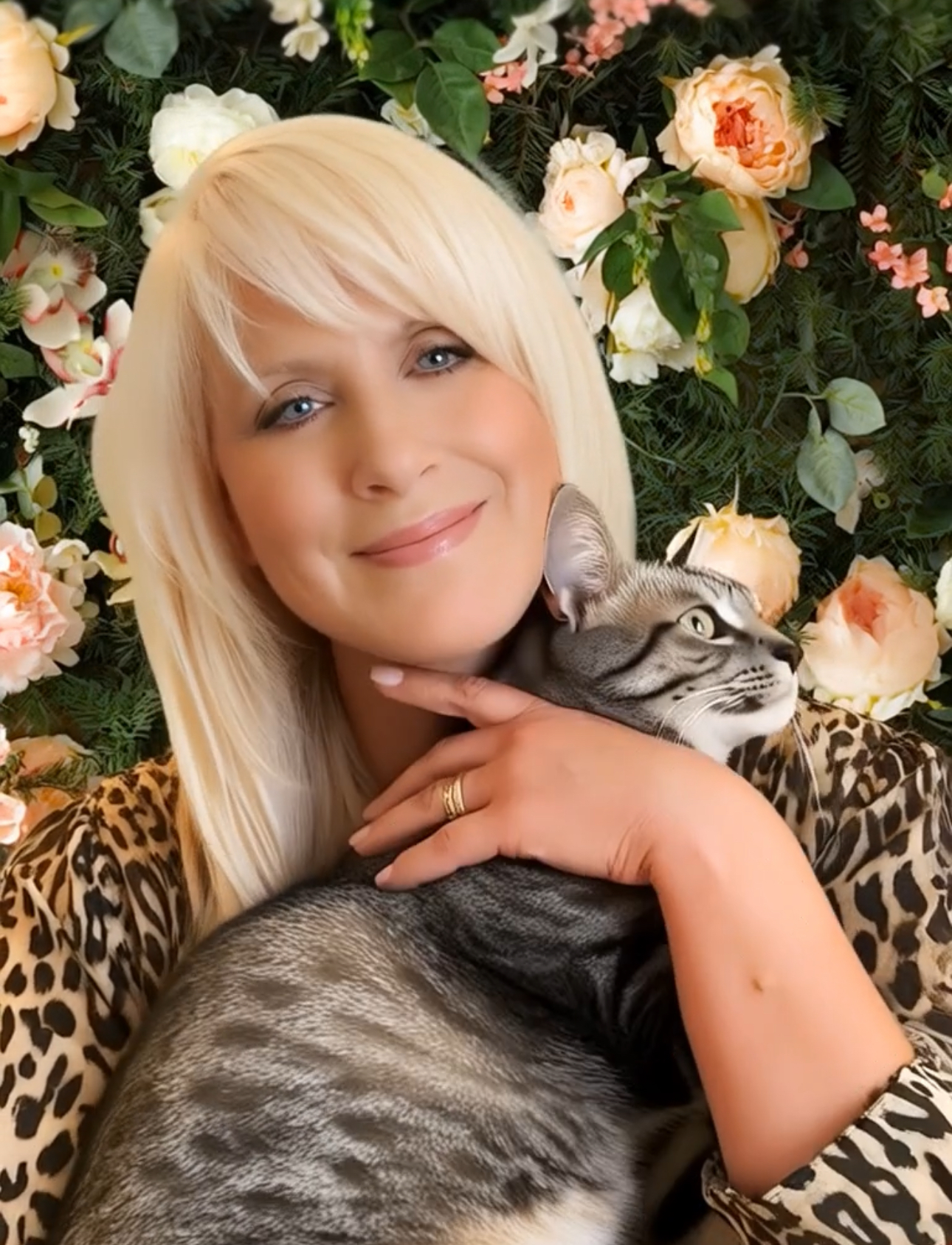







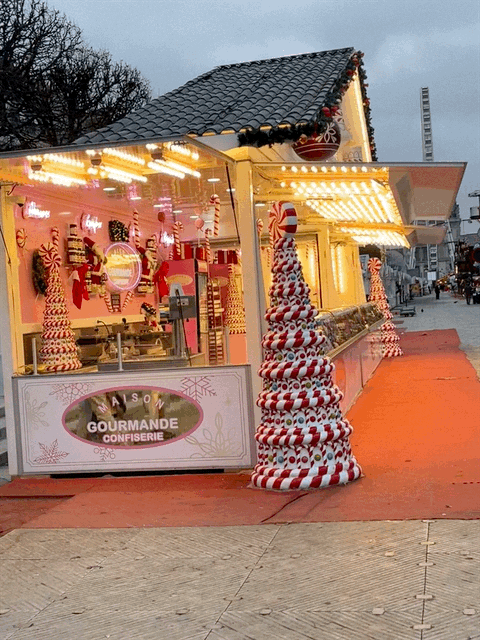






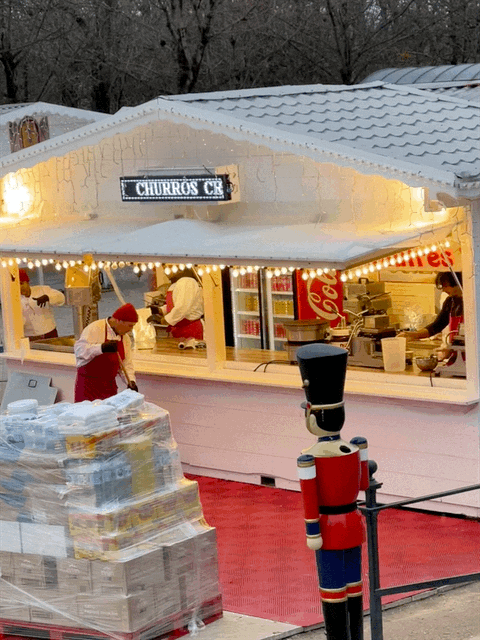













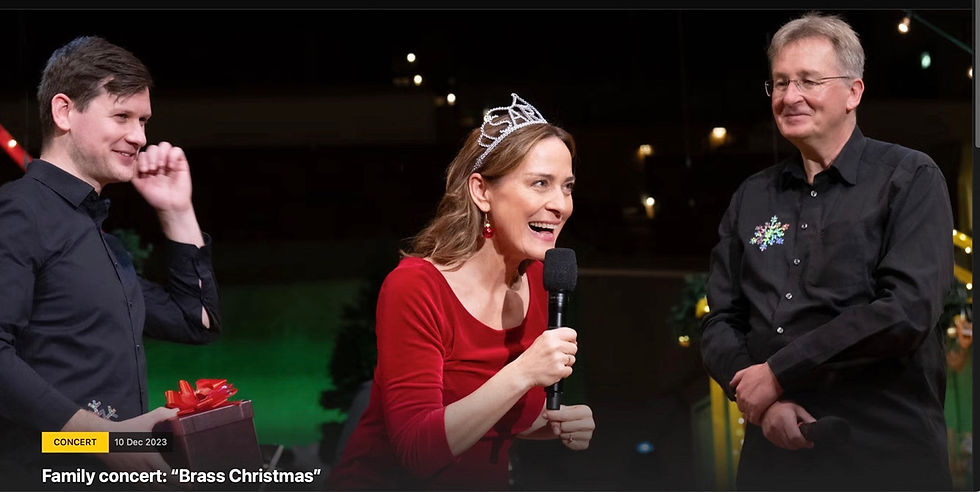































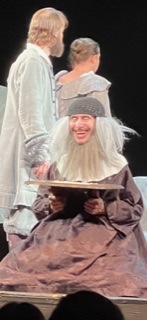
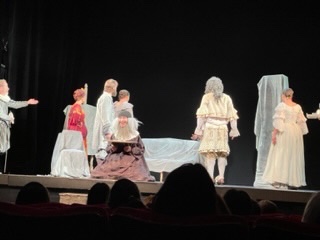
















Quel joyeaux et magnifique histoires! I hope my Francais was proper. Such joy and pleasure-ful , rich holidays! ♥️♥️
Happened to open this right away as it was posted--what a lovely holiday, so rich with many cultural masterpieces and shared meals. How kind to mention PCC and me; our honor to have you present to us again. Left everyone wanting more--as does your blog! thank you,
Leigh